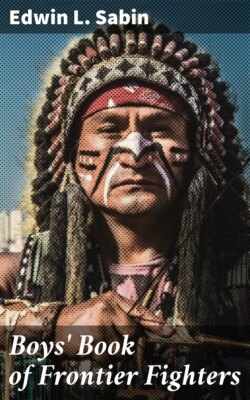Читать книгу Boys' Book of Frontier Fighters - Edwin L. Sabin - Страница 18
На сайте Литреса книга снята с продажи.
SCOUT KENTON HAS A HARD TIME (1778–1779) HOW HE PAID FOR HIS HORSE-STEALING
ОглавлениеWhen Boonesborough was besieged this last time, Daniel Boone's most trusted man (excepting his own brother) did not take part in the defence. Young Simon Kenton—or at present Simon Butler—was absent, with his friend Montgomery also.
After the gleeful Simon had shot the two Indians at once, near Paint Creek town, and had spied upon the town itself, he and scout Montgomery had stayed while the others hastened back to Boonesborough. They were not at all satisfied to have come so far and to have taken only one scalp.
Now this Simon Butler or Simon Kenton was a dare-devil pure and simple: a youth of roguish but extremely obstinate spirit. He had started upon the adventure trail at sixteen, and here at twenty-three he already had many hair-breadth escapes in his memory and many notches in his rifle-stock.
First, when he was sixteen he had fallen in love, at his home in Virginia, and had fought a rough-and-tumble with his man rival, by name William Veach or else Leitchman. He seemed to be holding Leitchman pretty even, too—until his rival's friends jumped in and pummeled Simon well.
Lad Simon limped away, bruised and bleeding, scarcely able to walk—for such fights were wild-cat fights with claws and teeth. He bided his time; he grew rapidly, and by April, 1771, being six feet tall at last (the true border height) and strongly muscled, he challenged Leitchman again.
They stepped into the timber, and fought. It was nip and tuck. No friends were at hand. But Simon was still too young; down he went, under the rain of blows, and Leitchman, taunting him with the loss of his sweetheart, proceeded to "give him the boots."
Simon lay and took it, saying no word. His mind was active. He noted his enemy's long hair, reaching to the waist—a fashion among the border beaux. An idea occurred to him. He grasped one of the piston-like legs and sank his teeth into it. Yelling, Leitchman dragged him and sought to get free. Down he tumbled, also, tripped in his efforts. Simon grabbed at his hair, wound it around the trunk of a small sapling, and had him!
He saw red, did Simon; a moment more, and the man was gasping as if dying. This was more than bargained for. Horrified, Simon plunged into the wilderness, just as he was. He was a poor boy, a hard worker on the Kenton farm, and had not learned even to read or write; now he thought himself a murderer; he changed his name to Butler and the forests swallowed him.
In those days there was always hunting and exploring and Indian-fighting to occupy the wanderer. Anybody accustomed to a rifle could be of use in opening new country. He speedily fell in with another wanderer, driving a pack-horse. They lived like Indians in the Alleghany Mountains region of southwestern Pennsylvania.
Two years passed. In March, 1773, Simon Butler, aged eighteen, was camped with two other hunters, named Strader and Yager, beside the Great Kanawha River of northwestern West Virginia. They were trappers as well as hunters: white Indians who traded their furs in at Fort Pitt.
This day Indians attacked the camp; Yager toppled over, dead; and when Simon and his older comrade, Strader, managed to gain the highway of the Ohio River, westward, they were nearly dead, too, from starvation.
Simon soon became a scout. He achieved fame as a spy against the Indians. From Fort Pitt he and another Simon—Simon Girty—employed by the military government of Virginia traversed the forests far and near, watching the movements of the Indians. Simon Girty deserted to the Shawnees, during the Revolution, and was a cruel enemy to all his former fellow-Americans; but Simon Butler remained true blue.
